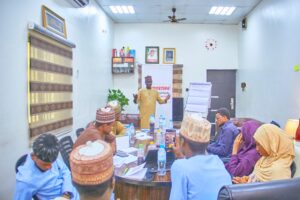The Youth Political Participation (YPP) project, in collaboration with Jesz Development Foundation (J-DEV), organized a step-down training for eleven young advocates in Kano State on Saturday.
The initiative, supported by the Canadian Fund for Local Initiatives (CFLI) and Kimpact Development Initiative (KDI), aimed to strengthen youth voices and equip them with advocacy and community organizing skills.
The Kano state Coordinator of YPP, Umar Faruk Musa, explained that the training was a follow-up to an earlier Training of Trainers workshop held in February 2025.
“This step-down training builds on the foundation laid in February,” he said.
“The goal is to prepare youth for high-level advocacy and enhance their ability to engage in key dialogues on electoral reforms.”
“The objective is to prepare youth through practical exercises, boost their confidence, and improve their skills to ensure they are well-prepared for advocacy efforts,” he added.

Speaking during the training, Barrister Nura Ahmad Muhammad, the founder of Mufarka Youth Development Initiative, facilitated a session on advocacy techniques.
“When setting an advocacy message, it requires an approach that must be simple, concise, clear, and straightforward,” Muhammad explained.
He emphasized the importance of language in advocacy.
“The use of language should be carefully considered because, in some cases, the people you’re advocating for or taking the advocacy to might reject it simply because of how it is communicated.”
Other sessions covered topics such as theories of change and community organizing.
Ibrahim Salihu, one of the participants, expressed gratitude to the organizers.
He noted that the training had deepened their understanding of electoral reforms, particularly the structural aspects of Nigeria’s electoral system.
“We are now better equipped to mobilize our communities and advocate for policies that promote democratic governance,” he said.
At the end of the training, participants pledged to follow up on five key recommendations aimed at improving Nigeria’s electoral process.
The recommendations includes; “Reducing the deadline for the Independent National Electoral Commission (INEC) to stop issuing voter cards from 90 days to 60 days before an election.
To also establish a stakeholder committee, composed of representatives from civil society, religious and traditional rulers, and other key groups, that would have the power to elect the INEC Chairman instead of the President.


